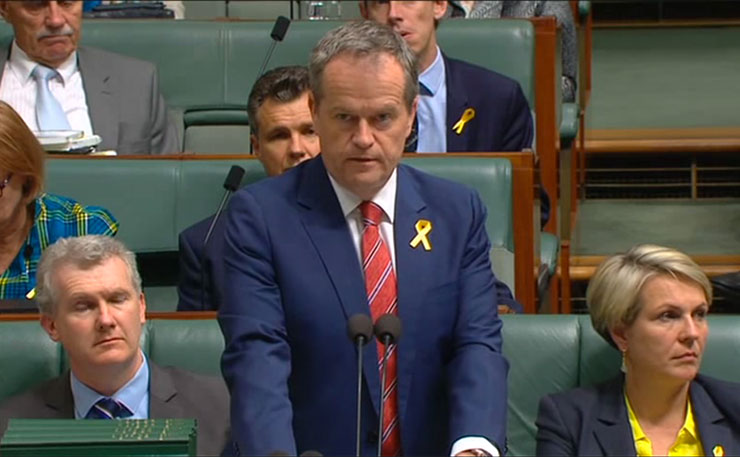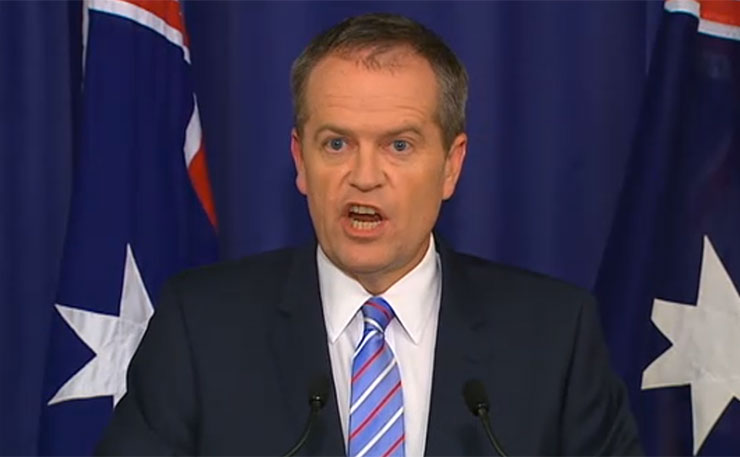After resisting a Royal Commission into bad banks for several years, the Opposition Leader appears to have had an epiphany. Which of course has nothing to do with an upcoming election, writes Michael Brull.
Opposition Leader Bill Shorten has come out in favour of a Royal Commission into banks and financial sector crime. As with all things Bill Shorten, this was clearly a matter of deep-seated principle, a reflection of his inner-values, and nothing else.
On Friday last week, Shorten explained why he was now in favour of this Royal Commission. There have been a “string of scandals” which “has to stop”. They are “not isolated and one-off examples”, but there are “systemic problems in our banking and financial services industry.”
Members of Parliament from across the political divide have “had enough of hard working members of their communities being ripped off and losing their money.” There are “literally tens of thousands of victims” of “banks and financial institutions.” There are “Retirees who have lost their retirement savings, small businesses who have lost their livelihood, Australian families who have lost hundreds of thousands of dollars, life insurance beneficiaries denied justice and legitimate claims”.
So why did Shorten announce this position on Friday? The first thing to note is that Shorten and the ALP previously opposed a Royal Commission into the banks.
In June 2014, a Senate inquiry into Commonwealth Bank malfeasance handed down its report. The Commonwealth Bank was involved in a fraud scandal that left thousands of customers “millions of dollars out of pocket”.
A subsidiary of the Commonwealth Bank – Commonwealth Financial Planning (CFPL) – put client’s money into risky investments, and the Bank was accused of covering it up.

The Senate Committee chairperson Mark Bishop – a then West Australian-based ALP Senator – said at the time, “These actions were facilitated by a reckless, sales-based culture and a negligent management, who ignored or disregarded non-compliance and unlawful activity as long as profits were being made”.
The Bank’s “compliance regime failed, which not only allowed unscrupulous advisers to continue operating, but also saw the promotion of one adviser, thus exposing unsuspecting clients to further losses”.
The Australian Securities and Investment Commission (ASIC) is supposed to investigate crime in the corporate sector. Bishop said, “ASIC appears to miss or ignore clear and persistent early warning signs of corporate wrongdoing, or troubling trends that place the interest of consumers or investors at great risk”.
ASIC also didn’t pay enough attention to whistle-blowers, and the Senate Committee grew more concerned as they learned more. Bishop noted, “Recent developments whereby both ASIC and the CBA have corrected their testimony about the compensation process for affected CFPL clients have intensified the committee’s misgivings about the integrity and fairness of this process. Given the seriousness of the matter, the egregious nature of the conduct, the potential number of clients affected and the lack of transparency during the compensation process, I believe that a Royal Commission should be established.”
And so what was the political response? Coalition Finance Minister Mathias Cormann said he had some “conversations” with the senior leadership of the Commonwealth Bank, and threatened to have some “further conversations”.
ASIC, particularly tame after a 12 per cent cut to its budget that year, also wasn’t in favour of a Royal Commission.
Bill Shorten – by that stage Leader of the Opposition for nine months – decided not to back the Senate Committee’s call for a Royal Commission. Instead, he called for a new parliamentary inquiry. He announced that he was “not convinced the Government is doing anything to prevent this happening again to thousands of other Australians.” But no so convinced that his party should back the report’s recommendations.
By contrast, the Greens responded to the report on the day it was released, welcoming it and adding their party name to calls for a Royal Commission specifically into the Commonwealth Bank.
But with opposition from both of the major parties, the idea died out from public attention.
In 2015, there was a fresh Senate inquiry into white collar crime, this time involving the six big financial institutions. The six bosses were invited to appear before the Senate to answer some questions.
Then, Adele Ferguson reported, the invitation was withdrawn. Instead, the CEOs of CBA, Westpac, ANZ, NAB, AMP and Macquarie were invited to appear individually.

Ferguson wrote that there was a strange “rumour that the invitation was pulled after the chairman of the Senate Economics Committee and SOFA inquiry Senator, Sam Dastyari bowed to pressure from the shadow treasurer Chris Bowen and Opposition Leader Bill Shorten, who, in turn, had been pressured by the banks.”
For their part, Bowen and Shorten “vigorously denied” this rumour.
The Greens once again pushed for a Royal Commission into corruption in the finance sector in June 2015. It got nowhere. The Coalition was opposed, and the ALP shadow treasurer Chris Bowen said they would not support the motion “at this time”.
However, he was “concerned by continued reports of alleged misconduct by financial advisers that see Australian investors lose out”. Which was his version of strongly expressing mild hypothetical disapproval of potential but unproven misconduct.
Ferguson and Sarah Danckert, reporting for Fairfax, were less uncertain. They observed the recent “string of banking scandals and explosive revelations about wrongdoing inside IOOF,” an Australian financial services company. These included, within “the past couple of years” various “scandals inside CBA’s financial planning division, NAB, Macquarie Private Wealth and now IOOF, which manages more than $150 billion of customer money and has 650,000 clients.”
Greens Senator Peter Whish-Wilson observed that the Senate inquiry had called for a “Royal Commission just on the evidence surrounding misconduct at the Commonwealth Bank. Since then, a number of additional scandals have come to light, with the latest being IOOF. The government is happy to have political witch-hunts into the pink batts scheme and union wrong-doings but won’t act to investigate the damage to tens of thousands of victims of white-collar crime.”
Whish-Wilson concluded by expressing disappointment “that Labor and the government did not support this call. The case is there for a Royal Commission: the public interest test is strong”.
When the vote went to the Senate, Nationals Senator John Williams crossed the floor to support the Green’s motion. Zero ALP Senators voted in favour of the motion. Fairfax reported that “Opposition Leader Bill Shorten and shadow treasurer Chris Bowen were not keen to help launch an investigation into the entire financial services sector.”
Christopher Joye, writing for the Australian Financial Review, explained that the ALP opposition to such a Royal Commission inquiry can be traced back years: “Labor repeatedly rejected calls from experts and its own Treasury to investigate the banks between 2009 and 2013.” For example:
“In July 2009 economists from the left and right sides of the political spectrum published a detailed opinion piece in Fairfax newspapers arguing that “a broad-based inquiry into the integrity of Australia’s financial system is warranted”. Treasurer Wayne Swan dismissed the idea despite opposition support. The Gillard government again rejected the need for a sweeping inquiry into the banks after the August 2010 election even though Treasury informed it that “many countries are reviewing financial regulation frameworks and making substantial changes” following the global financial crisis.”
Thus, Shorten’s support for a Royal Commission, as of April 8 was something new. How can we understand it?
Last week, as reported by Fairfax’s James Massola, ASIC “launched action against Westpac Bank over alleged rigging of the bank bill swap rate, while it launched an action against the ANZ Banking Group for similar behaviour, while the Commonwealth Bank has been caught up in allegations of unethical behaviour by its insurance arm”.
After years of scandals, and a fresh round of actions directed at the banks, on April 6, former co-chairman of Goldman Sachs in Australia, Malcolm Turnbull gave a speech at Westpac. Though Turnbull included plenty of praise for the banks, he also said that “there have been too many troubling incidents over recent times for them simply to be dismissed. The truth is that despite the public support offered at their time of need, our bankers have not always treated their customers as they should”.
Turnbull almost immediately rushed to assure his audience that “wise bankers, like our host” understand the need to behave better, and Brian Hartzer – the Westpac CEO and Managing Director – had “very keen insight into these matters”.
Turnbull’s very mild criticism was included in a generally pro-bank speech, where he claimed that Westpac “has helped millions of Australians build their dreams of independence”, that banks are businesses “unlike any other”, a “fundamental pillar, a foundation, of our society, and our economy”, and much more.

That this was considered a significant development is due to the tremendous power and influence in Australian politics of the four big banks, and six other major companies, as recently observed by Senator Dastyari.
On April 7 – that is, the day after Turnbull’s speech made front page news, and presumably resonated with the public generally – Shorten responded.
As the issue of banking and financial sector crime is well-established, as are the long-ignored Senate recommendations noted above, Shorten was naturally asked if the ALP would support a Royal Commission into the banking sector.
Shorten replied: “Frankly, I’m a bit surprised that the Government has quickly ruled out having a Royal Commission.” He added: “It’s time for Mr Turnbull to stop ruling out very quickly the option of the Royal Commission and instead start listening to what every day Australians are saying, and they don’t like the bad behaviour of banks.”
The journalist replied: “I’m sorry, do you want a Royal Commission into banks?” Shorten replied: “I don’t think you can rule it out quickly.” So apparently, Turnbull’s sin was not rejecting a Royal Commission, but doing so “quickly”. At the time, Shorten and the ALP had been rejecting a Royal Commission for years.
Shorten then went on the offensive: “I looked very carefully at what Mr Turnbull said at Westpac’s birthday party. He said one thing which was important, he said ‘there are very serious issues about banks’ behaviour’. But the other thing he then did is nothing about it. I think Australians are sick of politicians who talk tough and do nothing. I think it’s frankly quite contradictory.”
Indeed, it is.
That same day, Fairfax reported that the ALP was considering backing a Royal Commission. However, they didn’t want to “rush the process, nor be seen to be simply trying to one-up Prime Minister Malcolm Turnbull after he rebuked the banks in a major speech at Westpac on Wednesday.”
Some might think the latter did happen. After both parties stuck to a policy of verbal criticism – but avoided the prospect not of substantive change, but merely the scrutiny of a Royal Commission – Shorten’s calculations have changed, with an election looming, and the prospect of it including a fight about unions.
After first having floated publicly the idea of backing a Royal Commission in Fairfax.
Thus, on April 8 – two days after Turnbull’s speech – Bill Shorten and the ALP decided they now supported a Royal Commission into the banks and finance sector. The questioning he received was more enlightening than the answers he gave:
JOURNALIST: Why now, why today? There was a report from the Senate over a year ago and you had a dissenting Labor Senator actually recommended a Royal Commission. We’ve had scandals that’ve emerged since then. You guys haven’t acted, now today you’ve acted. Can you tell us what the trigger was for today? I understand you’ve been considering it for a while. But what is the actual trigger for today’s announcement?
SHORTEN: Well, enough is enough. The fact of the matter is that there have been different inquiries, parliamentary inquiries that you’ve referred to…
JOURNALIST: Is there an element of tit-for-tat though? The Coalition’s run a Royal Commission into trade unions in which you yourself were cross-examined. Is there an element of tit-for-tat, saying we’re going to go your primary support base which is big business?
SHORTEN: No, this is a much bigger issue …”
This is not the first time Shorten has changed his political position in a way that doesn’t inspire much confidence. In August last year, he backed the now infamous Australian Border Force crackdown in the very brief window of opportunity he had to do so before it was cancelled.
It is undoubtedly a good thing that the ALP now backs a Royal Commission into the banks and finance sector. Yet it is hard not to notice the sheer cynicism of Shorten’s new position.
What has changed isn’t the financial sector, but his political calculations. Whilst we should welcome a Royal Commission into the banks, the fact is, the banks have enormous wealth and power. Taking on the banks to try to implement a Royal Commission’s recommendations would be a huge political battle, requiring courage, principle, and possibly sacrifice.
Does anyone seriously believe that Bill Shorten is the politician with the principle and conviction to pick that fight and see it through? Anyone?
Donate To New Matilda
New Matilda is a small, independent media outlet. We survive through reader contributions, and never losing a lawsuit. If you got something from this article, giving something back helps us to continue speaking truth to power. Every little bit counts.





